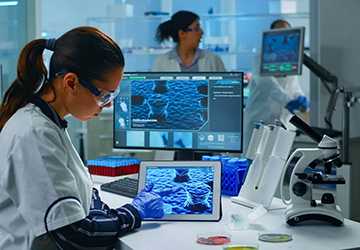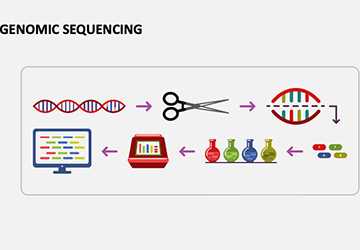Biotechnology The Emerging Frontier in Healthcare
As the world grapples with growing health issues, rapid advances in biotechnology have ushered in a new era of healthcare; medical biotechnology offers cutting-edge solutions. This presentation closely examines biotechnology's current and future impact on healthcare, describing the progress made and the possibilities that are on the horizon.

The Role of Biotechnology in Modern Medicine
Transformative Technologies
Medical biotechnology is changing the paradigm of healthcare. Technologies such as CRISPR and gene editing are at the forefront, providing unprecedented precision in improving genetic variation. These technologies can:
- Correct genomic mutations
- Develop customized therapies
- Improve understanding of pathophysiological mechanisms
Advances in healthcare biotechnology have also led to the introduction of novel diagnostic modalities, enabling early detection and therapeutic intervention of disease.
Personalized Medicine
One of the most significant advances in health biotechnology is the introduction of personalized medicine. By carefully examining a person's genomic blueprint, healthcare providers can tailor treatment plans specifically for them. This paradigm has proven to be very effective in:
- Oncology, with targeted tumour treatments
- Rare genetic diseases
- Treatment of chronic diseases
Personalized medicine represents the future of biotechnology in healthcare, where therapeutic interventions are not singular but carefully tailored for optimal results.
Biopharmaceuticals: A New Wave in Therapeutics
Innovation in Drug Development
Biopharmaceuticals are profoundly influencing the future of healthcare biotechnology. These pharmaceutical preparations, derived from living organisms, provide targeted, effective treatments. Essential areas of impact are:
- Monoclonal antibodies for autoimmune diseases
- Vaccines for infectious diseases
- Cell and gene therapies for previously untreatable diseases
Biopharmaceuticals highlight the massive potential of biotechnology in medicine and drive advances in health biotechnology.
Immunotherapy
This is another promising area of medical biotechnology. It harnesses the body's immune system to fight disease, especially neoplastic disease. Advances in health biotechnology have led to the development of various immunotherapies, such as:
- CAR T-cell therapy
- Immune checkpoint inhibitors
- Tumor vaccines
These interventions are revolutionizing cancer treatment and represent the future of biotechnology in healthcare.
The Future of Biotechnology in Healthcare
Emerging Trends and Innovations
The future of biotechnology in healthcare is full of potential. Emerging trends include:
- Artificial Intelligence and Machine Learning in Pharmacology Research
- Nanotechnology for Precision Drug Delivery
- Bioprinting for Tissue and Organogenesis
These innovations represent the pinnacle of medical biotechnology and are driving advancements in health biotechnology.
Ethical and Regulatory Challenges
The sudden spread of biotechnology in medicine has created ethical and regulatory difficulties. Ensuring patient safety, confidentiality, and equal access to advanced treatments is critical. The future of healthcare biotechnology must overcome these complexities to reach its full potential.
Real-World Applications and Case Studies
Success Stories
Empirical applications of biotechnology in medicine have demonstrated their transformative impact. Notable success stories include:
- Development of a COVID-19 mRNA Vaccine
- Gene Therapy for Spinal Muscular Atrophy
- CRISPR-Mediated Interventions for Sickle Cell Disease
These examples highlight the advancement of health biotechnology and the future of healthcare biotechnology.
Ongoing Research
Research in medical biotechnology is ongoing, with countless clinical trials and trials underway. The main focus is on:
- Alzheimer's disease and neurodegenerative diseases
- Cardiovascular diseases
- Rare genetic abnormalities
Continued research investment is essential for advancing health biotechnology and shaping the future of healthcare biotechnology.
Breakthrough Therapies in Biotechnology
Advanced Therapeutic Modalities
Medical biotechnology has accelerated the development of sophisticated therapeutic modalities such as RNA interference and antisense oligonucleotides. These modalities provide avant-garde approaches to treat countless diseases by:
- Elimination of disease-causing gene expression
- Regulation of allelic transcription
- Targeting of specific RNA molecules
These advances in health biotechnology are revolutionizing the therapeutic landscape and providing new options for previously intractable diseases.
Regenerative Medicine
Regenerative medicine is a growing discipline in medical biotechnology that focuses on repairing or replacing damaged tissues and organs. The main components of regenerative medicine include:
- Stem cell therapy for tissue regeneration
- Biofabricated organs and tissues
- Scaffold-based tissue engineering
These innovations represent the future of biotechnology in healthcare and will relieve patients with severe injuries and chronic diseases.
Genomics and Precision Medicine
Genome Sequencing
Genome sequencing is a fundamental pillar of medical biotechnology, allowing for the careful identification of genetic mutations and polymorphisms. The technology has enabled:

- A deeper understanding of inherited diseases
- Identification of new pharmacological targets
- Development of precision diagnostics
Advances in health biotechnology enabled by genome sequencing have paved the way for personalized treatment regimens based on an individual's unique genetic blueprint.
Pharmacogenomics
Pharmacogenomics is a subdiscipline of medical biotechnology that studies how genetic differences affect an individual's pharmacological response. By understanding genetic differences, healthcare providers can:
- Optimize the effectiveness of drugs
- Mitigate adverse pharmacological reactions
- Personalize medication regimens
Pharmacogenomics represents the future of healthcare biotechnology, where treatment regimens are carefully tailored to each patient's genetic makeup.
Synthetic Biology and Healthcare
Synthetic Organisms
Synthetic biology is a field of medical biotechnology that deals with conceptualizing and constructing novel biological entities, devices, and systems. Healthcare applications of synthetic biology include:
- Synthesis of unprecedented therapeutics
- Development of biosensors for disease monitoring
- Development of drug-delivery microbes
Biocircuit Technology
Biocircuit engineering is a cutting-edge area of medical biotechnology focused on creating biocircuits to regulate cellular functions. Applications include:
- Programmable cells for customized therapies
- Biosynthetic pathways for drug production
- Cell systems for regenerative medicine
Applications of Biotechnology in Disease Prevention
Vaccine Development
Medical biotechnology has greatly expanded vaccine development. Modern technologies such as recombinant DNA technology and viral vector platforms have enabled:
- Rapid development of vaccines against emerging diseases
- Improved vaccine effectiveness and safety
- Novel vaccine delivery systems
Antimicrobial Resistance
Fighting antimicrobial resistance is one of the biggest challenges facing medical biotechnology. Innovative strategies to combat resistant pathogens include:
- Synthesis of novel antibiotics
- Use of bacteriophage therapy
- Implementation of antimicrobial peptides
Biotechnology and Mental Health
Neurotechnology
Neurobiotechnology is a branch of medical biotechnology focused on deciphering and treating neurological and psychiatric disorders. Key advances include:
- Development of neuroprotectants
- Treatment of neurological disorders using gene therapy
- Development of brain-computer interfaces
Psychopharmacogenomics
Psychopharmacogenomics is an emerging field of medical biotechnology that studies the genetic determinants that influence an individual's response to psychotropic drugs. Benefits include:
- Customized treatment regimens for psychotropic drugs
- Reduced side effects
- Improved treatment effectiveness
Conclusion
Biotechnology is on the verge of revolutionizing healthcare. Advances in health biotechnology and the future of healthcare biotechnology offer tremendous solutions to some of our most significant medical problems. If we continue to harness the power of medical biotechnology, the possibilities for improved health outcomes are endless. This exciting new field will undoubtedly shape the future healthcare landscape.